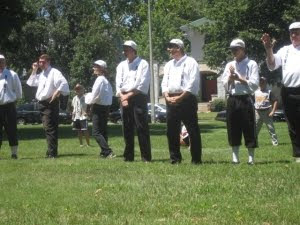Helen Edwards was not raised to do housework. Her father died when she was just a child, leaving her mother to raise the children in a series of boarding houses on the East Coast. She was never required to cook a meal, do washing, or undertake any of the endless, onerous tasks that went with household management in the 19
th century.
All that changed when Helen moved into Edwards Place as a young wife and mother in 1843. Servants in Springfield were nearly impossible to find, so the
Edwardses had brought a hired woman up from St. Louis. This woman, however, was so "intemperate," as Helen recalled, that "in less than a year I was obliged to discharge her and my troubles in housekeeping began." Suddenly she was responsible for everything that went with
maintaining a two-story, six-room brick house (the house wasn't enlarged to its present size until the late 1850s): cooking meals, tending fires, sewing clothes, cleaning, milking the cow, making soap and candles...everything.
It wasn't easy, to say the least. Helen later told the story of standing "in agony over the churn and the butter that apparently never would come, the tears
streaming down her face and into the cream - crying the more because she was sure her husband would notice the extra salty flavor and make stern comment on it.
Next Helen tried hiring “farm girls,” but none of them knew how to keep house very well, nor did they “know their place” – some insisted on sitting at the table with the family, which Helen just
couldn’t have. At one point they had an indentured servant, but Helen found her more trouble than she was worth. When she and Benjamin tried to discipline her, this girl would scream and yell. Helen was glad to be rid of her.
She finally found a steady supply of servants when the construction of the Illinois and Michigan canal and local railroads brought a flood of Irish immigrants to central Illinois. Just because Helen had servants didn't mean her housekeeping troubles were over, however. Later she would tell her granddaughter that having servants to manage often times just made more work for her.
Helen's letters to her daughter during the 1860s and 1870s are full of the trials and tribulations of managing servants. At one point she complained that her good was wasteful; another time she was irritated with a servant for talking back and called her "a provoking piece of humanity," still later she felt obliged to nail down sections of carpet herself because her hired man was "not at all particular about these matters," and still another time she recorded that "I dismissed my house girl on Monday morning, and yesterday took in, a brand new girl, from the Emerald Isle."
Still, despite Helen's "servant problems," domestic help was necessary to the maintenance of Edwards Place. At any one time the household would have a cook, parlor maid, and hired man. Additional help was also brought in for sewing and washing. Helen was not alone in needing servants, either. The onerous nature of household management in the era before electricity and running water meant that practically every middle class household had at least one domestic servant in its employ. They were meant to stay invisible, working in kitchens and sleeping in attics or back rooms, yet it was through their hard work that houses such as Edwards Place were able to shine so magnificently.





























